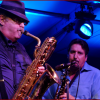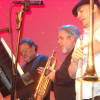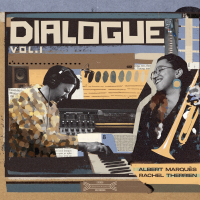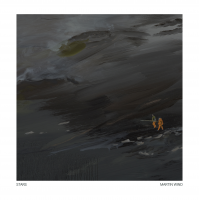Home » Jazz Articles » Album Review » Tower of Power: 50 Years of Funk and Soul
Tower of Power: 50 Years of Funk and Soul
Horns? They've carried up to six at a time, to hell with diminished door splits. A big band of scorching funk, Tower of Power traces its roots to 1968 Oakland, where it flourished in a thicket of sound tearing at industry barriers. The band, initially dubbed the Motowns, was founded at the juncture which begat Blood Sweat and Tears, Chicago Transit Authority, and Earth Wind and Fire. Even then, the soul—if you will—of Tower of Power was born in the muscular arrangements and searing leads of the former as much as the latter's R&B core.
As "horn bands" became a thing, the Grass Roots (studio musicians, sure, but an explosive lot out of the Wrecking Crew), the Electric Flag, the second Butterfield Blues Band, the Buckinghams, Gary Puckett and the Union Gap, Ten Wheel Drive, Brass Construction, Chase, Average White Band and the Ides of March (remember "Vehicle"?) tossed this urgency through the pop charts. And on isolated singles, the Beatles, the Stones, the Doors, the Rascals and so many others were briefly enraptured in brass. Into the 1970s, numerous rock ensembles either formed around a horn section or similarly adopted one, so exciting the concept: Joe Cocker's Mad Dogs and Englishmen, Janis Joplin's Kozmic Blues Band, the revolutionary all-women Isis, Elephant's Memory (Lennon-Ono collaborators) and blue-eyed hitmakers Rare Earth among them, with Southside Johnny & the Asbury Jukes carrying the torch into the next decade. It's no small irony that R&B artists begat the tradition of imbedding horns into the music, an outgrowth of late1940s jump bands. Like rock and roll itself, this was an artform of African Americans, yet few members of the most popular horn bands have been people of color.
Tower of Power was founded by tenor saxophonist and vocalist Emilio Castillo, originally from Detroit, and Stephen Kupka (baritone saxophone). The two saxophonists quickly filled out the horn section, adding propulsive rhythm to it all. Suffice to say, the brass and woods were never sacrificed in favor of synths, let alone a preponderance of Lite-FM ballads. By 1970, drummer David Garibaldi had joined, shaping the rhythmic foundation while helping to define the role of the drum set in funk along the way. Garibaldi, after a lengthy break, returned to the driver's seat in 1998. Also arriving with the band's 1970 recording debut East Bay Grease were singer Rufus Miller, trumpet player/arranger Greg Adams, first trumpeter Mic Gillette, saxophonist Skip Mesquite, percussionist Brent Byers and the hugely influential bassist Francis Prestia. The band's emulsion of genres, so vital to a period in which African American and Latino culture, too, took the mainstream in defiance of institutional racism. 1972's successful Bump City album introduced Rick Stevens, vocalist ("You're Still a Young Man"), whose brief career would prove to be utterly star-crossed. However, Tower of Power's eponymous third album (Warner Brothers, 1973) featured "So Very Hard to Go" and "What is Hip?," and by follow-up Back to Oakland (Warner Brothers, 1974), they'd defined the genre. Singer Lenny Williams, who'd become the band's new voice, had roots in gospel and a work pedigree which included Sly Stone, Billy Preston and Andrae Crouch. His role quickly ignited the soul core of ToP. A year later, the outstanding guitarist Bruce Conte and celebrated organist Chester Thompson became primary soloists alongside the horns, cementing with a multi-cultural wallop an honest amalgamation of sounds.
Through the years streams of members have come and gone with Castillo and Kupka withstanding every shift, every phase, thus, the band has maintained a strong presence. Tours across the nation and planet, either headlining or as an opener for the likes of the Rolling Stones, Santana, Creedence Clearwater Revival and Rod Stewart were commonplace through the decades. The horn section alone was called on to provide biting, orchestral backing to a swath of music legends—Otis Redding, Heart, Eric Clapton, Jose Feliciano, Elton John, Santana, Graham Central Station, Labelle, Eurythmics, Aerosmith, John Lee Hooker, the Brothers Johnson, Rufus, Toto, and the Grateful Dead. Even after the departure of singer Williams, Tower of Power released another 23 albums as well as several noted anthologies. The career has been a prideful one.
2018 marked the band's golden anniversary and, yes, the document has finally been released: 50 Years of Funk and Soul: Live at the Fox Theatre, recorded in its Oakland home base. The latest line-up features Castillo, Kupka and Garibaldi along with Tom Politzer (first tenor saxophone), Sal Cracchiolo (first trumpet; a jazz vet), Adolfo Acosta (second trumpet), Jerry Cortez (guitar), Marc Van Wageningen (bass) and the blues-drenched keyboardist Roger Smith (former Jimmy McGriff student who'd toured with Leon Russell, Freddie King and Willie Nelson). Lead vocalist Marcus Scott possesses a broad range with an earthy, authentic voice which carries the older material well including the ballad "You're Still a Young Man." His brief acappella moments reveal a mastery of 1960s R&B and exchanges with the band's choir-like backing vocalists cast a certain timelessness. On several numbers including the enticingly cool medley "Diggin' on James Brown," leader Castillo takes the mic at centerstage, and his split lead with Scott on "You're So Wonderful" (from 1975's Warner Brothers outing In the Slot) is classic soul redux; listeners are left wondering why this isn't a current Top 20 hit. Several noted alumni are present including 1970s tenor saxophonist Lenny Pickett, trombonist/vocalist Ray Greene, organist Thompson, guitarist Conte, and bassist Prestia, who sadly died just months later. He nimbly takes over the bass chair on several hits, especially "Maybe It'll Rub Off," on which his considerable chops at bottom are a feature. On other selections regular bassist van Wageningen artfully throttles lines of perpetual motion, James Jamerson-like, wrapping them about rhythm and melody ("Stop" being but one example). Such a combination of classic and newer forces makes for a compelling retrospective. "We love these guys, and they love us," Castillo said in a recent interview (Oakland Press, March 25, 2021), and this sense of comradery well permeates the tracks.
Accurately crediting the numerous horn solos is near impossible, but the lead trumpet of Sal Cracchiolo pierces the atmosphere in the best way possible, offering blasts of fills that ring out over the wondrous melee. And Lenny Pickett's presence is as unmistakable here as in the Saturday Night Live band he's led over the years. His tenor is particularly unleashed on "Knock Yourself Out," riding on the rhythm section, turning aerial as his reed becomes a squealing falsetto pathway. And it seems to yet be another full-throttled Pickett solo on "Do You Like That?." The expanded horn section, thickened, impenetrable, grows still more solid as the album progresses, perhaps culminating in this piece. Here, the shouting accents are met pound-for-pound by Kupka's subterranean baritone lines. Thompson's (or Smith's?) Hammond B-3, too, sings out on this number and many more, alternately sobbing and biting with swooping, blue harmonies. Other highlights include the deliciously funky "On the Serious Side," more so "Maybe It'll Rub Off," and the leads by guitarist Cortez, reminiscent of Terry Kath, and organist Thompson leave one only wanting more. "What is Hip?," one of the most memorable sides recorded by the band in its heyday, is here paired with "Soul Power." The mass of horn riffs shout like a halleluiah chorus against vocals and throbbing rhythm. This cut includes blistering original guitarist Conte leaping back in his role with fervor, and a Cracchiolo trumpet solo that shredded the Oakland June evening like a saber; yours for the cost of a replay without the need to travel west.
With so much important, wonderfully executed music, the poor editing of the CD—wherein some talk on the song openings, or worse, the tail-end of a couple of numbers are severed—is baffling. While these breaks aren't very noticeable when skipping around the disc, for the codgers among us who listen to albums from start to finish, such sloppiness is inexcusable (was one of the producers perhaps a little too young at heart?). That said, the clear production faithfully captures the stage action, excitement, and historic moment, so it's hard to find fault here. As Marcus Scott told the crowd, "50 years long is 50 years strong!," and for Tower of Power, this remains indisputable.
Waylaid by the pandemic along with the rest of the music industry, the band is counting on the strength of vaccines and masks in normalizing life. And touring. If all goes as planned, Tower of Power will be at a hall near you by late summer 2021, grooving on the roar of "Soul Vaccination." And for the good of all, that song's moral had best resound well beyond the heat of summer '73 when it charted. This time around, let's paint the very skies above with it: "Soul vaccination/All across this nation/people been catchin' honkypox/ when you get the notion/Tower's got the potion/ you might look in to set yourself in motion..."
Track Listing
Stroke '75; Ain't Nothin' Stoppin' Us; You Ought to Be Havin' Fun; Soul with a Capital S; Stop; You're so Wonderful; Just When we Start Makin' It; On the Serious Side; Soul Vaccination; What is Hip; Do You Like That?; Drop It in the Slot; Can't You See?; Maybe It'll Rub Off; Don't Change Horses; Squib Cakes; On the Soul Side of Town; Diggin' on James Brown; So Very Hard To Go; Knock Yourself Out; You're Still a Young Man; Souled Out.
Personnel
Tower of Power
band / ensemble / orchestraEmilio Castillo
saxophone, tenorStephen Kupka
saxophone, baritoneDavid Garibaldi
drumsTom Politzer
saxophone, tenorSal Cracchiolo
trumpetAdolfo Acosta
trumpetJerry Cortez
guitarMarc Van Wageningen
bass, electricRoger Smith
organ, Hammond B3Marcus Scott
vocalsLenny Pickett
saxophone, tenorRay Greene
tromboneChester Thompson
organ, Hammond B3Bruce Conte
guitarFrancis Prestia
bass, electricAlbum information
Title: 50 Years of Funk and Soul | Year Released: 2021 | Record Label: Mack Avenue Records
Tags
About Tower of Power
Instrument: Band / ensemble / orchestra
PREVIOUS / NEXT
Support All About Jazz
 All About Jazz has been a pillar of jazz since 1995, championing it as an art form and, more importantly, supporting the musicians who make it. Our enduring commitment has made "AAJ" one of the most culturally important websites of its kind, read by hundreds of thousands of fans, musicians and industry figures every month.
All About Jazz has been a pillar of jazz since 1995, championing it as an art form and, more importantly, supporting the musicians who make it. Our enduring commitment has made "AAJ" one of the most culturally important websites of its kind, read by hundreds of thousands of fans, musicians and industry figures every month.




























